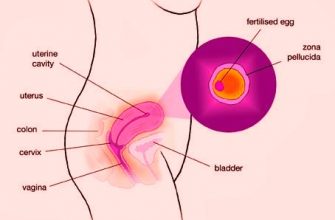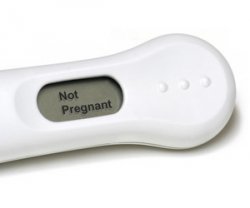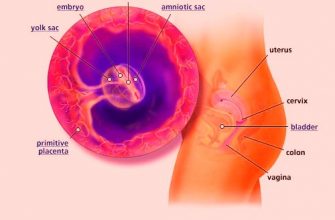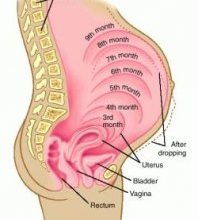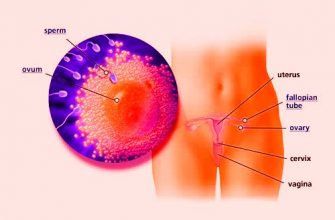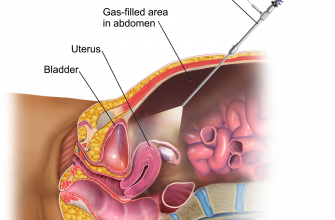Implantation is the very early stage of pregnancy when the fertilized egg adheres to the wall of the uterus. This adhesion enables the fetus to receive oxygen and nutrients from the mother. Embryo implantation marks the beginning of the so-called prenatal development phase.
- Implantation bleeding, period and miscarriage
- Implantation bleeding during an ectopic pregnancy
- How to tell implantation bleeding from endometriosis
- Common questions about implantation bleeding
Implantation usually occurs about 9 days after ovulation (a bit sooner or later in some cases). This corresponds to 7-9 days after the conception since it takes place the day of the ovulation or 1-2 days later. However, the actual coitus can take place 1-4 days before the ovulation or 1-2 days after it, both cases being able to secure pregnancy. Hence, implantation occurs in the range between 7 and 13 days after the coitus, depending on when the woman actually had unprotected sex.
Implantation entails the breakage of the egg’s protective lining and damage to some of the uterus’ tissues in the place of attachment. That is why a woman may experience the so-called implantation bleeding, or implantation spotting.
Normally, it lasts no more than 1-2 days. Its nature is not regular, so a woman will have it only once or twice within the specified time frame. Bleeding usually comes to a few small blood spots or, more likely, light spotting of pink or brown color. There can also be light yellowish discharge with few blood streaks.
Unlike menstrual flow, implantation spotting is very light and quick, so it is often overlooked or flushed before the woman even notices it. This is especially true for women who do not expect themselves to be pregnant. But even if you are planning a baby and are paying attention to your vaginal discharge, don’t worry if you have no implantation bleeding. It is rather normal to have no spots at all even if a viable pregnancy has occurred.
Apart from spotting, embryo implantation has several other symptoms:
- Cramps in the lower abdomen. They resemble those that usually appear at the start of each period.
- Breast soreness or swelling that lasts for more than two days.
- High basal body temperature (BBT) which remains up for several days.
- Frequent urinating.
- Food cravings or aversions.
- Heightened reaction to tastes or smells.
Just like spotting, the above-mentioned symptoms are not a must. Many women have only several of them or none of them at all.
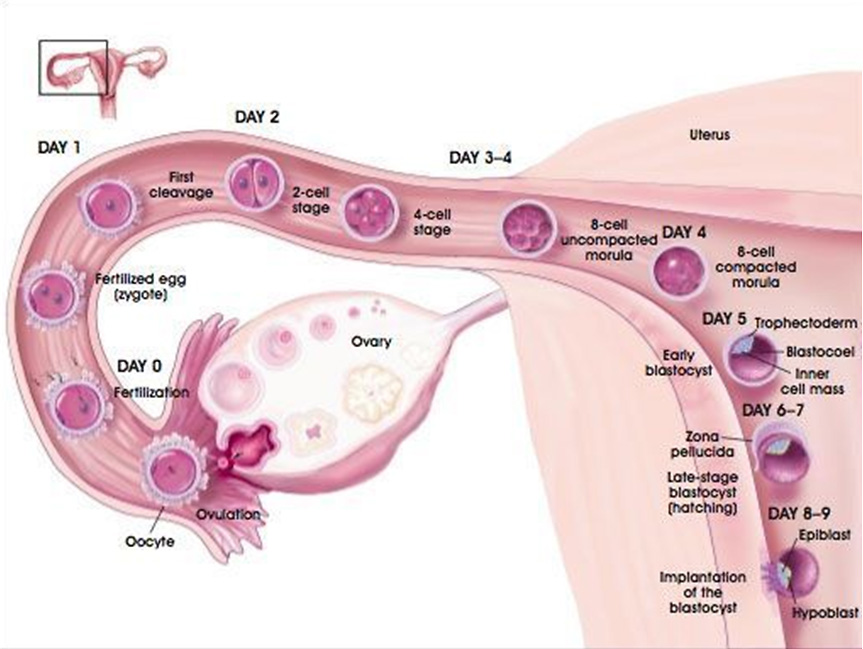
Implantation bleeding, period and miscarriage: how to tell the difference between the three?
Implantation bleeding usually comes close to the time when your next period is due, so it is often mistaken for early menses.
Here are some key differences:
•Start time. If you have a quite regular menstrual cycle and the period normally comes on time, then unusual anticipated spotting is likely to be implantation bleeding rather than the next period.
•Duration. The period normally lasts from 4 to 7 days, while implantation bleeding almost never exceeds 2 days.
•Nature of discharge. During healthy implantation bleeding there is no heavy blood flow. You will only experience light spotting of pink or brown color.
Hence, just because you notice early blood spotting, it does not mean that implantation has occurred. It could still be the first day of your regular period or some other medical issue. In order to know the difference you should know how your body behaves. Keep track of your menstrual cycle and pay attention to how each period starts and what you experience during them. If one day you feel something different, just wait for a couple of days. If spotting does not convert into a heavy flow, then you most probably have had implantation bleeding, and a pregnancy test is likely to show a positive result.
In other cases vaginal bleeding could also be a sign of an early miscarriage. According to the statistics, 1 out of 7 pregnancies ends within the first twelve weeks. An impending miscarriage starts with light spotting but then it turns to a heavier dark-red flow with visible clots that lasts for several days. Implantation bleeding does not have such symptoms, so if you have early red clotty discharge, then you’d better consult your gynecologist.
Implantation bleeding during an ectopic pregnancy
When an ectopic pregnancy occurs, the embryo implants somewhere else in your body except the uterus (most commonly in the fallopian tubes). This causes many symptoms, among which strong abdominal pain and bleeding.
Ectopic pregnancy bleeding is usually light and is often very similar to implantation bleeding. In other words, a woman who experiences light spotting at the time close to her next period may think that she has conceived and that her bleeding is one of the symptoms of a healthy pregnancy. But in reality her pregnancy is not viable and her body of sending the corresponding signals.
However, if the embryo attaches to the fallopian tube, then it may cause swelling and eventual rupture of the tube. In this case a woman will experience very strong pain and heavy internal bleeding that could be rather dangerous.
If you are having these symptoms, you should visit the hospital immediately. The doctor will measure your hCG to determine if an ectopic pregnancy occurred (women with ectopic pregnancies typically have lower-than-normal hCG levels). Unfortunately, it is not possible to save an ectopic pregnancy, and the removal is necessary.
How to tell implantation bleeding from endometriosis
Endometriosis is excessive growth of endometrial tissue in abnormal locations, such as the ovaries or inside the peritoneal cavity. This disease often causes conception problems and is sometimes rather difficult to cure.
Women with endometriosis can have bleedings in random phases of their menstrual cycle. If such bleeding occurs several days before the next period is due, then it can be easily mistaken for implantation bleeding.
Endometriosis bleeding is usually heavier than implantation and typically comes along with considerable pains. However, there is no precise in-home way to distinguish these two symptoms, so if you started having unusual pains or vaginal spotting, you’d better consult your physiologist.
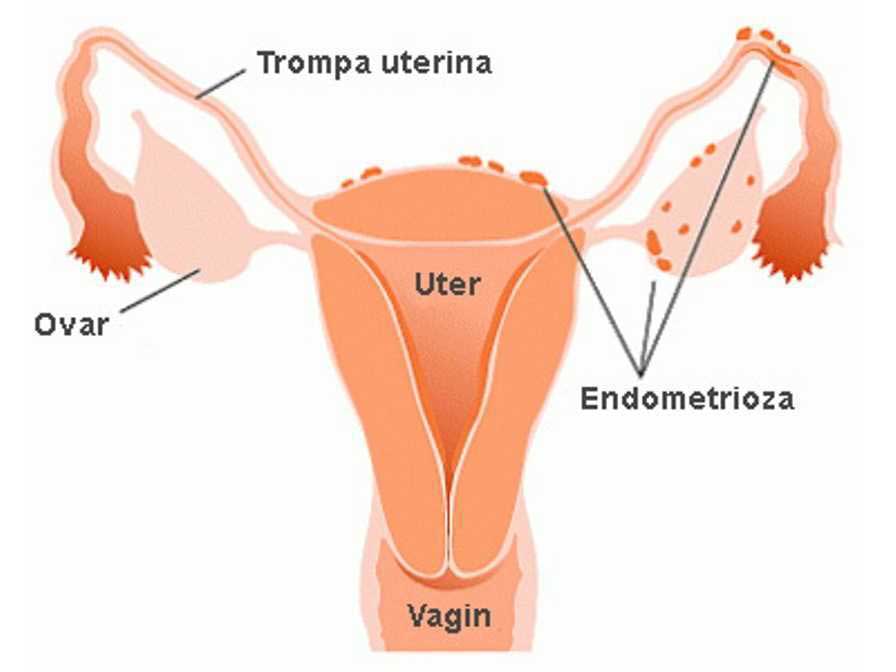
Common questions about implantation bleeding
Can implantation bleeding occur after a missed period?
No, this is not possible. Implantation, certainly, can happen earlier in some cases and later in others. However, it occurs only within 12 days after ovulation and not later, while the next period normally starts no sooner than on the 14th day after ovulation. Hence, implantation spotting comes at least 2 days before you notice a missed period, though usually this time frame is even wider.
Yet, it is true that if a woman had an abnormally short menstrual cycle (say, 22 days), then she would expect her next period on the 11th day after ovulation, and, hypothetically, in case of very late implantation, she would be able to spot a missed period 1 day before the bleeding comes. But this would mean that the first sure pregnancy sign comes when the egg has not yet implanted and pregnancy has not yet begun! This is not indeed possible. So if your period is about to start and the egg has not implanted, then it will fail to attach and will soon leave your body with usual menstrual flow.
How soon after implantation a pregnancy test will be positive?
Home pregnancy tests are based on the detection of hCG hormone in the urine. Pregnant women have a much higher level of this hormone than other women, but during the first days after implantation the level of hCG is not yet sufficiently high, and a test may fail to indicate pregnancy.
Reliable results can be obtained no sooner than 6-8 days after implantation. However, the final confirmation is only up to your doctor who will make an ultrasound examination.
Does implantation bleed always occur? Can I have no implantation bleeding at all?
Implantation bleeding is not a necessary symptom of pregnancy. Many mothers never experience spotting or have it only with one baby and not with the others. This is absolutely normal. So if your pregnancy test shows a positive result while you had no implantation bleeding or didn’t notice to have had any, don’t worry.
Is it normal to have heavy implantation bleeding?
Generally, no. Normal implantation bleeding is more like light spotting of pink, brown or yellowish color. Spotting can be one-time or it can last for 1-2 days. If you have heavy prolonged bleeding, it is recommended to consult the doctor.
Can implantation bleeding coincide with the period?
Usually, implantation bleeding comes about 9 days after ovulation while the next period is due on approximately day 14. However, if you have late implantation, then the bleeding may come very close to the first day of the next expected period, and in this case you may mistake one for the other.
Implantation bleeding during multifetal pregnancy
Multifetal pregnancy (or multiple gestations) is when two or more eggs are fertilized at the same time (fraternal twins), or when a single zygote is divided into two or more independent fetuses (identical twins).
Like a single pregnancy, a multifetal pregnancy entails egg implantation which can cause implantation bleeding. It may be slightly heavier than single implantation bleeding or last a bit longer (up to 3 days) but in general there are no particular differences. Hence, implantation bleeding can’t tell a woman whether she is carrying one or more babies.
I have had implantation bleeding but a pregnancy test gave negative results. What could it be?
If the bleeding was indeed caused by the egg implantation, then, most probably, you have simply made the test too early. Pregnancy tests usually give reliable results 6-8 days after the implantation, so if a test is made within 5 days after spotting, then the second line is likely to be invisible or so pale that you can easily fail to discern it. Try to repeat your test when at least one week passes after the spotting, and you will obtain the true result.
However, it may also turn out that your spotting was in fact early menses or a miscarriage. In this case the test result is correct since there is indeed no pregnancy. Yet, you should wait and see what happens next anyway, or (better) pay a visit to your doctor in order to find the true state of the things.


